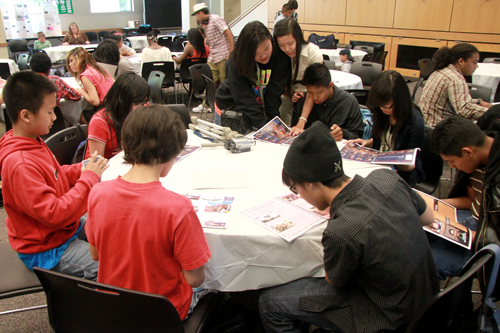It’s Thursday night and the students and staff of Upward Bound are celebrating.
Upward Bound students soar
It’s Thursday night and the students and staff of Upward Bound are celebrating.
Hoffman Hall is filled with poster board presentations exploring topics ranging from “math in real life” to Vietnamese food. Huge screens play videos and PowerPoint presentations created by students, while friends and family read scrapbooks of the preceding year, gaze bemusedly at explanations of hemochromatosis or play card games.

The students look around at their work with pride, and rightly so; these kids have come a long way, and their futures are undeniably bright.
Upward Bound is a long-standing federally funded education program focused on low-income and first-generation high school students. Phillip Dirks, director of the program at Portland State since 1996, describes its mission as “Ph.D. prep for high school.”
“We really want them thinking beyond the bachelor’s degree; they might need a master’s or a Ph.D. At one point, probably from 2000 to 2005, about 35 percent of our graduates had gone on to master’s programs.”
Since 1998, 80 percent of Upward Bound students have remained in college or have graduated, according to the program’s website. At PSU, Dirks and his staff assist students before they enter high school, training them to look at college as an achievable goal and preparing them for the hard work necessary for entrance into some of the country’s most prestigious schools and internships.
They come to PSU for six-week summer sessions, where they sharpen their academic skills and explore potential careers. Some have paid summer internships and others get individual academic advising.
Amy Le, a senior at Benson High, was able to do a highly selective marine biology internship in Monterey, Calif. Le wants to be a doctor but says that Upward Bound helps her explore alternative paths. “I like to do marine biology as a hobby. If I don’t go into the medical field, there are other options Upward Bound has shown me. They helped me be more independent, and they gave me the opportunity to study in California.”
DJ Gonzalez, an aspiring airline pilot and junior at Jefferson High, was able to attend the National Student Leadership Congress in Washington, D.C. “They help with tutoring, homework, keeping me motivated,” Gonzalez said. “The advisors keep me on track, make sure my grades are right; they really made the path clearer for going to college. I’ve always known I wanted to go to college, but I never knew how to get there, and with this I know how to get there. I know the steps.”
For many Upward Bound students, the realities of the college experience are rather alien, and the program strives to show them that they belong on campus. Coming from low-income families with little to no college experience, the students are given campus tours and spend summers studying at a campus.
“That’s probably our number one goal: getting the students exposed to college,” Dirks said. “They walk around and they go, psh, I can do this, I belong here.”
In a time when many Americans consider college a necessity, and go through higher education without a moment’s reflection, one wonders why these students even question their equal status. Many of them are clearly bright, and the fact that a program like Upward Bound is necessary seems to indicate a structural fault in the system. For Dirks, the problem lies in “the business model of education” that stresses test scores and benchmarks over “curiosity” and “creativity.”
“We had a Gates scholar score lower on the SAT than another student who barely graduated high school. If I had to guess who was going to be the most successful, of course I would’ve gone with the Gates scholar, who was a hard worker and always worked really hard on grades. But was that person a good test taker? No.”
Dirks considers this an endemic problem in education, where funding decisions are made on the basis of efficiency and profit. Under statutes like the No Child Left Behind Act passed by the Bush administration, test scores can determine how schools are funded. Oregon recently received a waiver from the act along with 32 other states, a development Dirks considers timely.
“High schools have been paralyzed by No Child Left Behind. Teachers feel like their hands have been cuffed and they can’t teach the way they want to teach…The business of education is to educate everybody. Not just some kids, or rich people’s kids. If that’s the true business of education, then why aren’t we putting more money into it?”
While the restructuring of public education and the obsolescence of Upward Bound may be the ultimate goals, for now both Dirks and the students are glad the program exists.
Ngan Ha, a double major in psychology and economics at PSU, entered Upward Bound as a sophomore in high school after her family emigrated from Vietnam. She now works as an advisor assistant for Educational Talent Search, a close affiliate of Upward Bound. Upward Bound helped Ha, a newcomer to the country, get acclimated, and also assisted with financial issues. “Right now I’m able to go to school and I don’t have to worry about money. I don’t have any loans at all. That’s where they’ve been really helping,” Ha said.
A glance at the crowded Hoffman Hall banquet tells another story. For all Upward Bound does logistically, financially and organizationally, its most obvious benefit is something else. These students look truly happy to be here, and they wear the expressions of people who have worked hard for what they’ve achieved.
“Upward Bound is like my family,” Le said. “It’s a once-in-a-lifetime thing.”




